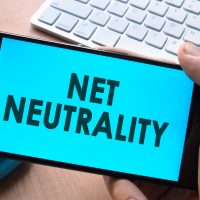
The Federal Communications Commission in a 3-2 vote on Thursday repealed net neutrality rules designed to regulate the Internet like a public utility.
The vote, which according to the New York Times, followed party lines — with GOP commissioners voting to repeal — dismantles rules implemented in 2015 during the Obama administration which govern internet service providers. The move, according to opponents of the repeal, grants broadband companies the power to potentially redefine customers’ Internet usage by the highest bidder.
The regulations prohibited broadband providers from blocking websites or charging for higher-quality service or certain content. The goal was to keep the Internet open and fair, net neutrality advocates say. Under the regulations, providers were required to treat all content equally and were unable to speed up or slow down content of specific sites or apps; providers were unable to give their own content an advantage over that of a competitor.
“To take a classic example, this means Comcast can’t just choose to slow down a service like Netflix to make its own streaming video service more competitive, nor can it try to squeeze Netflix to pay more money to be part of a so-called internet fast lane,” a CNN Money article states.
Proponents of the repeal, however, say the regulations potentially hampered innovation, and a repeal would open the door for providers to offer a wider variety of services to consumers.
Providers will be required to publicly disclose any instance of blocking, throttling or paid prioritization. It will then be evaluated based on whether or not the activity is anti-competitive.
“We are helping consumers and promoting competition,” Ajit Pai, the FCC chair appointed by President Donald Trump, said in a speech before the vote. “Broadband providers will have more incentive to build networks, especially to underserved areas.”
Pai has said publicly the move is more about keeping the federal government from “micromanaging the Internet.”
According to a New York Times report, the proposal is the most recent change the FCC has adopted under Pai’s leadership — including lifting media ownership limits, easing caps on what Internet service providers can charge business customers and scaling back a low-income broadband accessibility program. The proposal to end net neutrality regulations sparked protests nationwide and a call for some groups to challenge the decision in court.